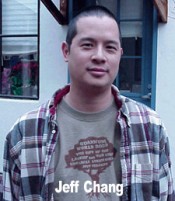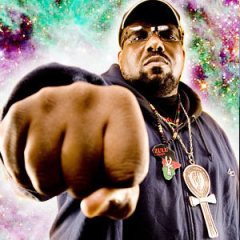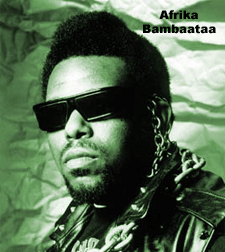 One thing about Hip Hop, if you limit yourself to what is presented via commercial outlets you will undoubtedly short-change yourself and miss out on a lot of stellar artists doing some great and innovative work. Please note the emphasis is on the word ‘art’. Its one of facet that Omar Akbar, aka Labtekwon, long time emcee, scholar and cultural analyst from Baltimore has always pointed out. The jewels of a cultural are not limited to one or two media outlets or individuals that may narrowly define or totally mis-define a culture and its people.
One thing about Hip Hop, if you limit yourself to what is presented via commercial outlets you will undoubtedly short-change yourself and miss out on a lot of stellar artists doing some great and innovative work. Please note the emphasis is on the word ‘art’. Its one of facet that Omar Akbar, aka Labtekwon, long time emcee, scholar and cultural analyst from Baltimore has always pointed out. The jewels of a cultural are not limited to one or two media outlets or individuals that may narrowly define or totally mis-define a culture and its people.
We sat down with Omar for an insightful interview focusing on both his long tenure in Hip Hop and how he has evolved himself and his craft over the years. For those who don’t know he’s 40 albums deep and celebrating his 20th anniversary producing and recording music. Yes you read that right he’s 40 albums deep in the game and has for most part has kept it independent. He noted its important to keep growing and not be caught in a time matrix of the Golden Era which he claims far too many are stuck in.
So will Labtekwon show up on the Billboard charts or at the next BET Awards show? Probably not, but step into the City of Baltimore and they know his name well. He’s a fixture in the city and his music and overall vibe that reflects its long and rich music history and traditions.
During the first portion of our Hard Knock Radio interview, Labtekwon kicks down a lot of important info on the make up ‘Charm City’. He talks at length about the popular HBO TV series The Wire and dispels many of the myths surrounding the show. He details how the series was both a blessing and a curse in terms of how people perceive the city. He cautions there’s a lot about Baltimore that folks need to absolutely get straight or risk finding one seriously getting played.
We talk about Baltimore being one of the first deejay/ club cities in the country, predating Hip Hop. Omar runs down the economic and cultural forces that were in play that led to Baltimore being a deejay oriented city that highlighted dance while neighboring DC became a place that highlighted bands and gave birth to Go-Go.
If a city could have a set of personalities attached to them, in our interview Omar compares and contrasts the mindset of many who reside in B-More and DC. Serious history lessons were given on this topic.
We talked about the recent trilogy of albums Omar released including; NEXT: Baltimore Basquiat and the Future Shock (State of the Art-Part 1)which pays tribute to the late artist Jean-Michel Basquiat. Omar details the importance of Basquiat and his contributions to art which are often overlooked. He talks about how Basquiat was a major influence on his life and work. He talks about the strong influence Basqiat had on Hip Hop.
We talked about the second album in the trilogy called; Hardcore: Labtekwon and the Righteous Indignation-Rootzilla vs Masta Akbar. Omar describes it as an album that pays tribute, refines and is the Apex to what many call ‘Knowledge Rap’..Here Omar talks about how he was greatly influenced by KRS-One and the Last Poets and that each song could be an academic thesis. He deals with complex topics like the monetary system, the construction of race, population control and the origins of Christianity to name a few.
It was an exhaustive undertaking he noted that took more than 4 months to gather up the material. Next he had to lay out the information, put it in rhyme form and make sure what was said was on point. The songs may remind people of Ras Kass‘ epic piece ‘Nature of the Threat‘.
The album was accompanied by a book that lays out in details his primary sources so that folks listening can check out what he was saying. The goal was not for people to simply regurgitate what he was saying, but to learn and then hopefully build upon what he laid out.
His latest album Evolutionary: The Omar Akbar Album/State of the Art rounds off the trilogy. Its more reflective and lays out some of the possible, new creative directions for Hip Hop to ascend.
https://soundcloud.com/mrdaveyd/hkr-an-epic-intv-w-labtekwon-the-swordsman-cometh-pt1
 In part 2 of our interview with Omar Akbar aka Labtekwon, we cover a lot of ground. We specifically focus on the power of culture and how there are constant attempts to undermine, co-opt, rename and exploit it.
In part 2 of our interview with Omar Akbar aka Labtekwon, we cover a lot of ground. We specifically focus on the power of culture and how there are constant attempts to undermine, co-opt, rename and exploit it.
He speaks about the failure of elders to safeguard culture and how that can be corrected. Omar noted that its extremely important that we invest in our community and uplift our culture.He described what is currently going on cultural gentrification with Hip Hop being a tool to uphold capitalism. He details how that is happening and what responsibility those of who who claim Hip Hop need to embrace in order to stop it..
Labtekwon spoke at length about Hip Hop in the Academy and how we are seeing the unfolding of an Academic Industrial Complex which is doing a disservice to the culture because many are not doing the work to employ specific types of rigorous methodology that would ensure Hip Hop has the solid grounding in the academy that it deserves. Lab noted that needs to be challenged and he’s one to do it. He describes himself as a swordsman who has mastered his skills and is ready to do battle kn the academy and on the stage to protect the soul of Hip Hop
https://www.youtube.com/watch?v=F56hRk25wH8
https://www.youtube.com/watch?v=zGhCCgmeYa4
https://www.youtube.com/watch?v=EdKU_asOa2k













 The Universal Zulu Nation gives HONOR and RESPECT to Brother Mr. Magic who was a Giant and Pioneer in the Growth of Hip Hop Radio. A brother who was not scare to challenge what was being played on mainstream radio. A brother who show Love not Hate when it came down to playing all forms of Hip Hop Music on the airwaves. A brother whom gave Hip Hop events so that the artist could have a venue to show their skills and craft for the people who love Hip Hop. A brother who help so many to start a career in Hip Hop as well as to help many artist get a record deal. Many of us in The Universal Zulu Nation knew of this brother before he was name Mr. Magic and watch him grow in the name of Hip Hop. He is due Respect and Honor and he will be truly missed. Mr. Magic May Allah be please with your soul and to your Family, Relatives and Friends many Blissings (not Blessings cause Blessings in Etymology means MArk with Blood) be unto you all.
The Universal Zulu Nation gives HONOR and RESPECT to Brother Mr. Magic who was a Giant and Pioneer in the Growth of Hip Hop Radio. A brother who was not scare to challenge what was being played on mainstream radio. A brother who show Love not Hate when it came down to playing all forms of Hip Hop Music on the airwaves. A brother whom gave Hip Hop events so that the artist could have a venue to show their skills and craft for the people who love Hip Hop. A brother who help so many to start a career in Hip Hop as well as to help many artist get a record deal. Many of us in The Universal Zulu Nation knew of this brother before he was name Mr. Magic and watch him grow in the name of Hip Hop. He is due Respect and Honor and he will be truly missed. Mr. Magic May Allah be please with your soul and to your Family, Relatives and Friends many Blissings (not Blessings cause Blessings in Etymology means MArk with Blood) be unto you all.